 |
 |
 |
 |
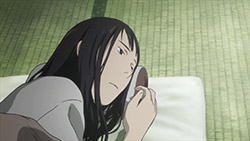 |
 |
 |
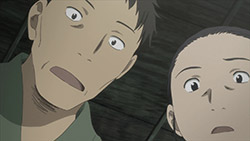 |
 |
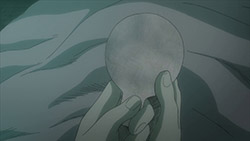 |
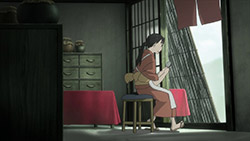 |
 |
 |
 |
 |
 |
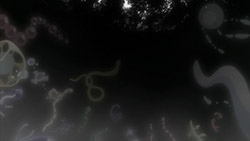 |
 |
 |
 |
 |
 |
 |
 |
 |
 |
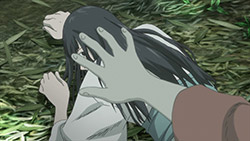 |
 |
 |
 |
 |
 |
 |
 |
 |
 |
「鏡 が 淵」 (Kagami ga Fuchi)
“Mirror Lake”
The symbolism is thick with this one.
Mushishi is fully back in the swing of things, and that means opening up the series to the darker side of existence now that the viewers have been gently reeled back in with three stories that run more towards the wistful and contemplative. “Mirror Lake” is scary, though not quite in the same way as last week’s “The Hand That Caresses the Night”. That was more of a primal, existentially unsettling experience – this story is more like something told around a campfire to keep complaining children from losing perspective.
More so even than in last week’s story, it’s Ginko who seems to be at the existential center of this one. The main protagonist this time is a very passive presence – the young woman Masumi (Shiraishi Haruka). In fact compared to the characters at the center of most Mushishi chapters she’s quite ordinary – a teenaged girl (again played by an age-appropriate seiyuu) who’s in love with the idea of being in love and has bad taste in men. So much so that when she seems especially listless and withdrawn after her most recent broken heart, her parents have no reason not to chalk it up to her usual heartsick moping.
The Mushi of the week is the Mizukagami (“Water Mirror”), as usual truthfully named. It hides in waters with especially reflective surfaces, like the clear, still ponds in mountain valleys (the one here is gorgeously depicted, though there are some off-model character moments this week – I suspect outsourced episode syndrome) waiting for an unsuspecting animal to come along. It then mimics than animal’s form, follows them around and slowly leeches strength from them, until one day it switches places and leaves the original as a bodiless, soulless “thing” forever lost in a world of darkness.
If you know anything about folk tales, you know that’s a pretty basic human fear personified – pretty much every culture has a myth or two that roughly coincides with this one. And Masumi is pretty universal too – the most recent bad seed to jilt her was a mirror polisher (a highly specialized trade, it seems to me) who fools around with her on his trips through the village but has obviously decided it’s time to look for greener pastures, both commercially and carnally (he’s especially cruel about it – “I don’t want a tomboy like you as a wife!”).
With both the human and mushi sides of the story being relatively straightforward this week, it falls to Ginko to make it memorable. His quiet but insistent reproaching of Masumi is the most compelling part of the episode. The lesson here is quite a simple one – while we take it for granted, the gift of a living, breathing body to house our being is a privilege we should be immensely grateful for. It’s certainly no coincidence that the way to unmake the Mizukagami is a mirror – to reveal the truth by reflecting it when it attempts to take over the body altogether when the target has grown weak enough. But when circumstances prevent the mirror in question from being used at the critical moment, it’s the act of opening her eyes to the truth that saves Masumi from a fate worse than death.
The ending of the episode proves to be the most interesting and surprising part (and no, I don’t mean Masumi marvelling at how good-looking Ginko is, though that was certainly amusing). For all Ginko’s description of Mushi as being soulless creatures without a true will (that’s consistent throughout the series) he clearly takes pity on this one – following it back to the pond it’s retreated to after Masumi foiled its plans, and offering to lead it deeper into the mountains (presumably so it can find a non-human victim – which is rather harsh of Ginko towards that unlucky creature). It’s certainly a fact that we as an audience have an incomplete understanding of Mushi, but it’s interesting to speculate on just how incomplete is the understanding Ginko himself has of them. His words seem to contradict his actions here, but perhaps this is an admission on Ginko’s part that Mushi are almost as big a mystery to him as they are to us.
End Card
 |

http://i.imgur.com/C6AXgUE.jpg
o_o’
I think that scene near the end wasn’t as much outsourced off-model as it was intentional. Ginko explanation sure sounded like pulled out of his arse on that moment, and the animation complemented that feeling.
Nice episode either way.
The mushi only switches with other beings in order to find a more suitable water body to call home. By taking it to a lake deeper in the mountains Ginko is helping it satisfy the need without switching with anything human or otherwise. Although if the mushi wants mineralized water it should just start moving downward into the groundwater, which generally gains more dissolved minerals the deeper it goes.
Exactly- not so much taking pity on the wretched creature as simply doing damage control while also respecting the fact that the mushi itself is a living thing (Even if it is soulless and emotionless) and shouldn’t be needlessly killed- Returning to one of this show’s recurring themes which is that we should respect all forms of life, depicted many times in the first season through contrasting Ginko’s unconventional mushi-friendly methods of resolving the problems that they cause, never killing them unless it is absolutely necessary, unlike most other mushishi. It comes back to Ginko’s core philosophy that mushi are merely creatures doing what they need to do to live, much like us humans and so their lives are equally worthy of respect…
Yeah! It reminds me of the first season when he was the only one telling the ‘not’ killing mushi stories to the lady with the mushi in her leg.
I gotta admit, this episode’s MC-of-the-week wasn’t quite as endearing as Mushishi’s usual characters. Watching a girl mope around for a dickish guy, it brought me bad flashbacks from Twilight.
Well, it’s typical teenage behaviour isn’t it. And this episode certainly had a better message than Twillight. Open your eyes! Get over that guy! Polish your own damn mirror!
My guess is that Ginko seems them as souless creatures in the definition of “soul” as a consciousness… like knowing right and wrong… or as religious. For example, in some religions only humans have souls and animals don’t. Even though, they do have feelings.
One think he keeps saying since season 1, it is how Mushi are not bad and that they only want to survive. I think he respects them as living creatures that only look for survival and recognizes that in that matter they are like us.
Man that guy was a dick -.-
He didn’t deserve Masumi but I did feel for her and glad she wanted to live. It was hilarious how she started going after Ginko at the end once she was all better.
I don’t feel Masumi is inherently a passive person; she chooses to go after someone rather than moping at a distance. I get the sense that her forthrightness is nothing new. It’s her broken heart, plus the effect of the mushi, that I think work together to make her depression dangerous (unlike the past rejections it’s implied she’s suffered). I was happy that, even though it was her eyes that saved her, she already had made the decision to live, so no need to be rescued by Ginko.
I also admired how the act of polishing the mirror could represent sexual (or romantic) dalliance, as well as the decision to live, be active. It’s an important moment when M decides to polish the mirror and cry: I think that moment of strength was a nice foreshadowing of her final resolution to live.
Haruka Shiraishi! I knew that voice from Sengoku Collection 🙂 Very good episode, though, I think this is the weakest so far among the bunch. More Tanyu please 🙂
What if the switch did happen? The only account is from the girl herself, which explained the mood swing at the end of episode, and Ginko made up explanation and doing something behind their back after the case resolved.